Throughout matriculation at Spelman, the focus on academics can cloud your view on all the aspects that make the full Spelman experience. To embrace and understand the value of both the academic and social opportunities, one most be able to find balance and make sure to capture and embrace the moment. We explore this with Blair Martin, a sophomore English major and Entrepreneurship and Innovation minor from Wisconsin, as she discuss her experience with finding her balance and bonding within the Honors program and how she transformed her passions into career goals during her experience.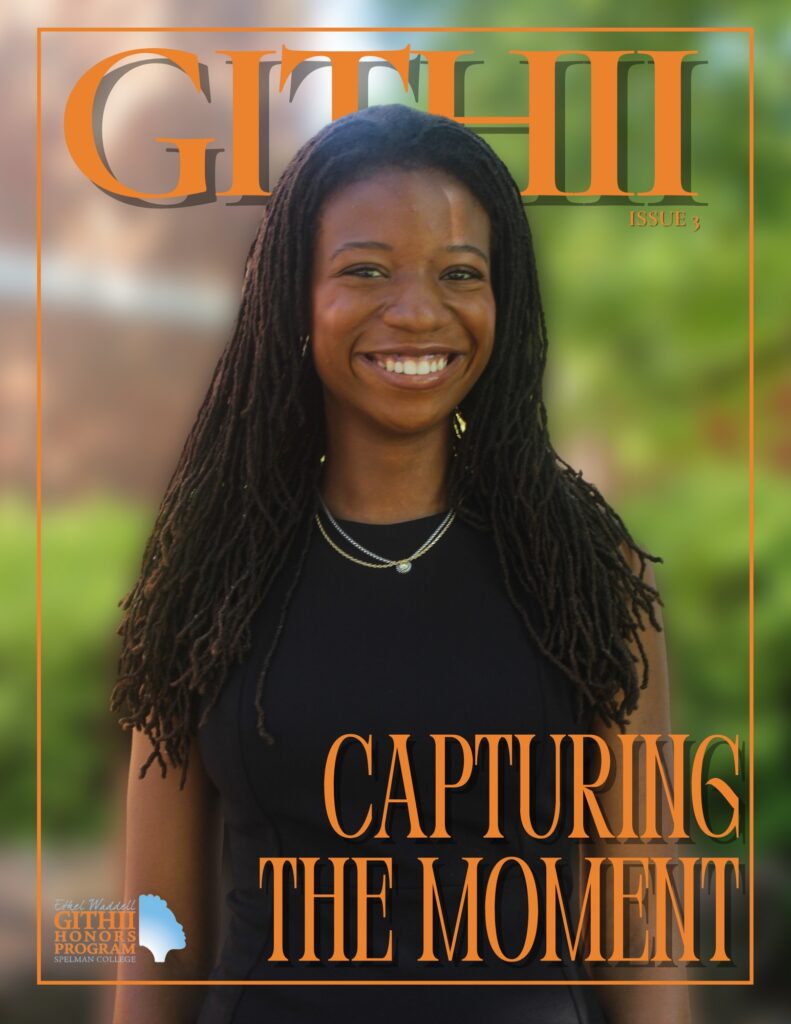 One of the key components for the Ethel Waddell Githii Honors Program is developing an intellectual community both within and outside the program. First-years students are given the chance to bond by being put in the same dorm. Blair discusses her encounters and interactions with her Spelman sisters and what that meant to her.
One of the key components for the Ethel Waddell Githii Honors Program is developing an intellectual community both within and outside the program. First-years students are given the chance to bond by being put in the same dorm. Blair discusses her encounters and interactions with her Spelman sisters and what that meant to her.
Q. What does the honors program mean to you and how has it prepared you for your career goals, interests, and skills?
A. The program means a lot. I remember when I was applying I thought this seemed like it was fleshed out and had its specific niche within the campus community. I really appreciated that it wasn’t just a tagline added to a person’s title, but rather it’s something that you’re embedded in and interact in on several different levels throughout your matriculation.
My first-year, it was really great being able to live with everybody and have that living-learning community where my peers, my classmates, and my “colleagues” were all kept in the same space.
As far as professional development, I learned so much being in the community physically and intellectually with those people. Without this program, we wouldn’t have come together in that way. I lived with a lot of health science majors and that is the complete opposite of my interest, but I learned so much about the simple things from a different viewpoint. Like how to get work done, prioritize, and how to think critically about the next steps because they have to go at their work in a completely different way and that gave me a lot of perspective in how I like to orient myself.
Socially, it’s been lovely to have a group of people that have a similar passion in how we move throughout these spaces which comes from our similar interests in intellectual sovereignty. Thinking critically about what we want to do, how we are interested in doing it, and what we have to offer in the spaces we want to enter. Without the lectures we were in, having it reiterated, [the development of how we think and operate now] would have been thrown to the waste side, especially since we aren’t raised to think in that specific way. For a lot of people, school is just a place to check your boxes and wash your hands of it. Being in a program like this really allowed us space to develop our thinking into what it is now.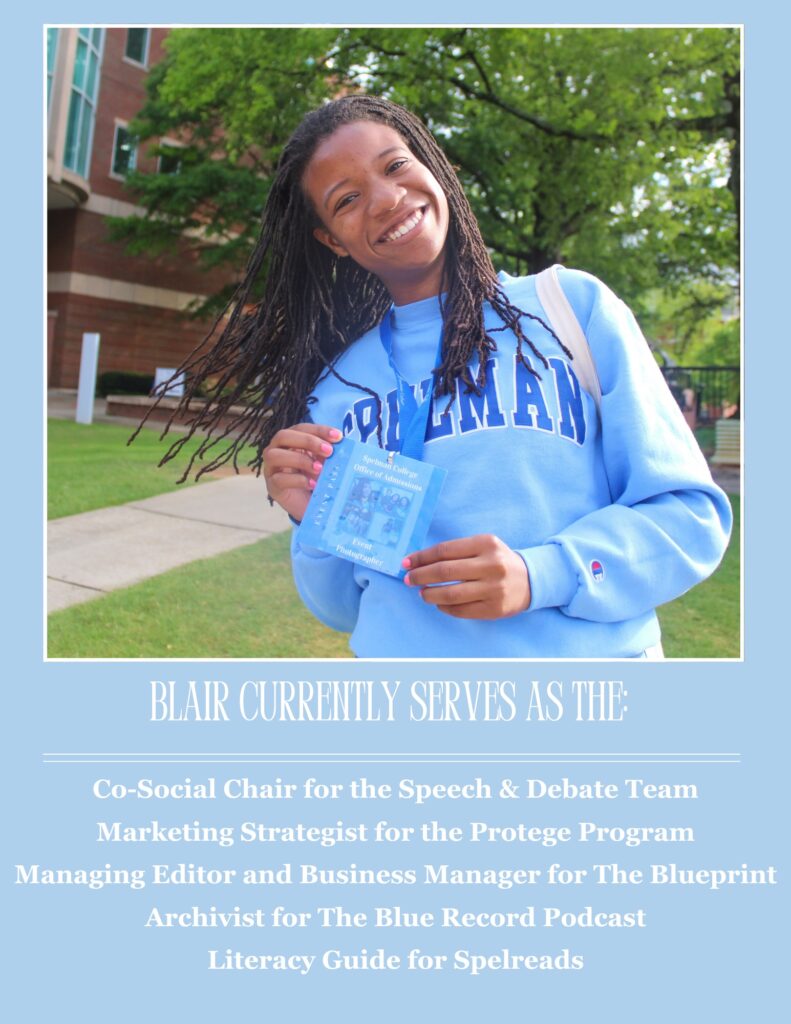
Q. As a sophomore, what has been the biggest difficulty of honors and the best benefit?
A. I don’t think I’ve run into any specific difficulties within honors, besides some small logistical issues. It’s obviously a rigorous program but also its requirements are specified really early on, so I think any difficulty probably won’t reveal itself until later on.
As far as benefits, for the quick answer, early registration. Having that ease of being able to select how you want your academic life to look like here is something I definitely don’t take for granted.
Again with the living-learning community, having everyone in your hall or floor centered on the same aspirations and came into Spelman with similar interests was amazing.
Q. As a sophomore, how have you found your balance for your school work, your passion, and your social life?
A. Trial and error. A lot of trial and error. Figuring out what works, what doesn’t, how to make time for myself and what I like to do. Also making and finding space to get your work done so you’re not coming home with a lot of weight on your shoulders, so you can have time for the people you love.
For my social life, just be open to a lot of people. During the first year, a lot of people get into a sort of survival mode and try to grab on to whoever’s around you. Once it starts to slow down, start taking the steps to be mindful of the individuals around you and not just bulldozing through your time. Just be open to different social opportunities and possibilities and appreciate the space we’re in.
With a passion for writing and photography, it was important to incorporate her interests into her life at Spelman and find a career path that fulfills her desire and passions, while supporting a lifestyle that she wishes for. By exposing herself to non-traditional paths, Blair was able to find paths that wouldn’t have been obvious to her if she had limited herself to the typically or usual path for writing or journalism.
Q. Shifting into your passion for journalism, what sparked your interest in it?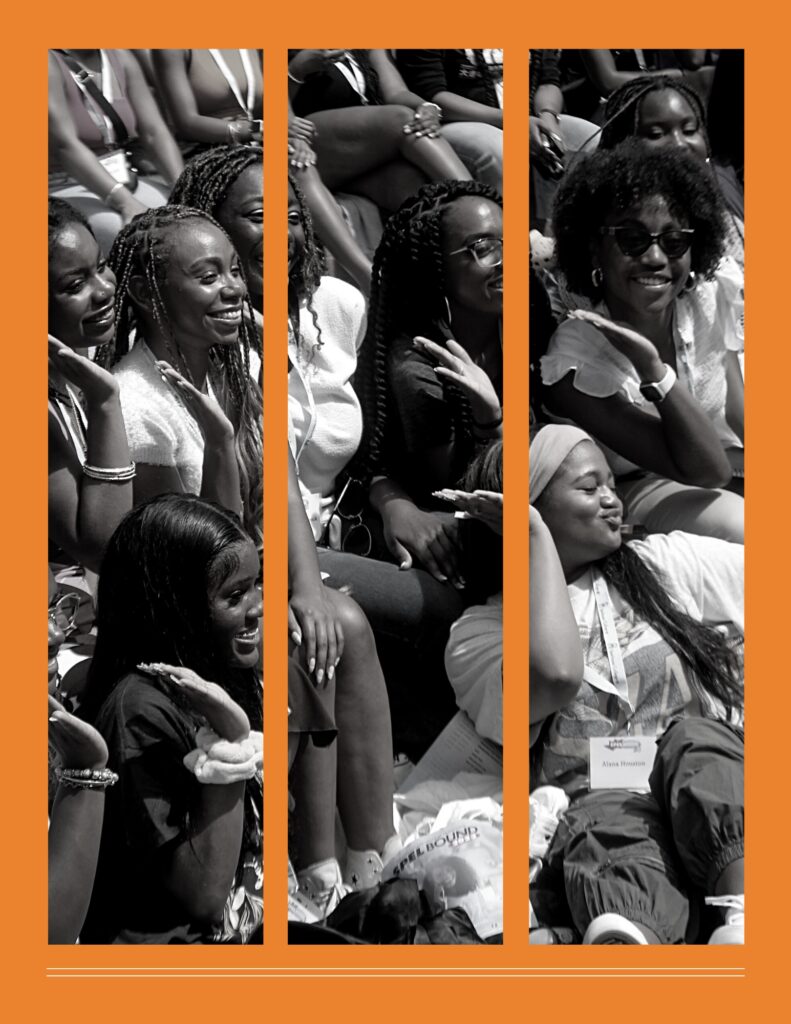
A. I’ve always liked to write. When I was younger, I’ve always loved reading and writing and believed that whatever I do with my career, I don’t want it to be something I dread. If I’m going to work for X amount of hours and days, it should at least be something I find fulfilling that I feel grounded in. Writing for me doesn’t feel like work. If you have the passion, interest, and curiosity there, it doesn’t feel draining. It might be and feel like hard work, but that isn’t necessarily a bad thing.
As far as career wise, I thought “how do I take something that has always been fundamental in how I operate academically, professionally, and even personally, and make it something that I do as a career?” Figuring that out as I go through school has been really interesting and seeing all the ways it can manifest itself in different spaces. I realized it didn’t have to be this cut and dry thing. Just because you say you want to be a writer, doesn’t mean you have to write in the traditional sense, but rather learn how to transfer your skills into different areas.
Q. What has helped you the most in exploring different interests to find your career path?
A. Something I’ve done since I was young is following people whose careers interested me or their quality of life interested me, so I could get an understanding of what those paths look like on a more realistic level. Creating an understanding of how all these people that you want to model your career after did it, makes it feel a lot easier and a great part of coming to age or coming into our professional lives is that people are a lot more transparent about their careers and of the closed, “just figure it out” mentality. People are very open about what they studied, where they entered, the questions they asked, and these are the boxes that they checked.They are also open that you don’t have to do those things and there are different avenues and a myriad of different factors. It helps me understand the possibilities in a less traditional way and how it’s up to you to take the initiative to find them.
Q. How would you describe your photography? What do you try to capture when you’re doing that?
A. When I’m going out to shoot candids specifically, I want to seem like I’m not even in the room. Obviously, as a 5’11 person, people are going to see me, but I want to float and allow people to be who they are in the spaces they’re in. I took pictures for Spelbound for the Admissions Office and it was interesting to see the nerves, intrigue, and excitement from hundreds and hundreds of girls and seeing how they interact with each other. I want to catch those moments between the ooh’s and aah’s. Those are the pictures I like the most. So when I am going out to take pictures, I ask myself if I’m trying to paint a story, what moment would I need to get.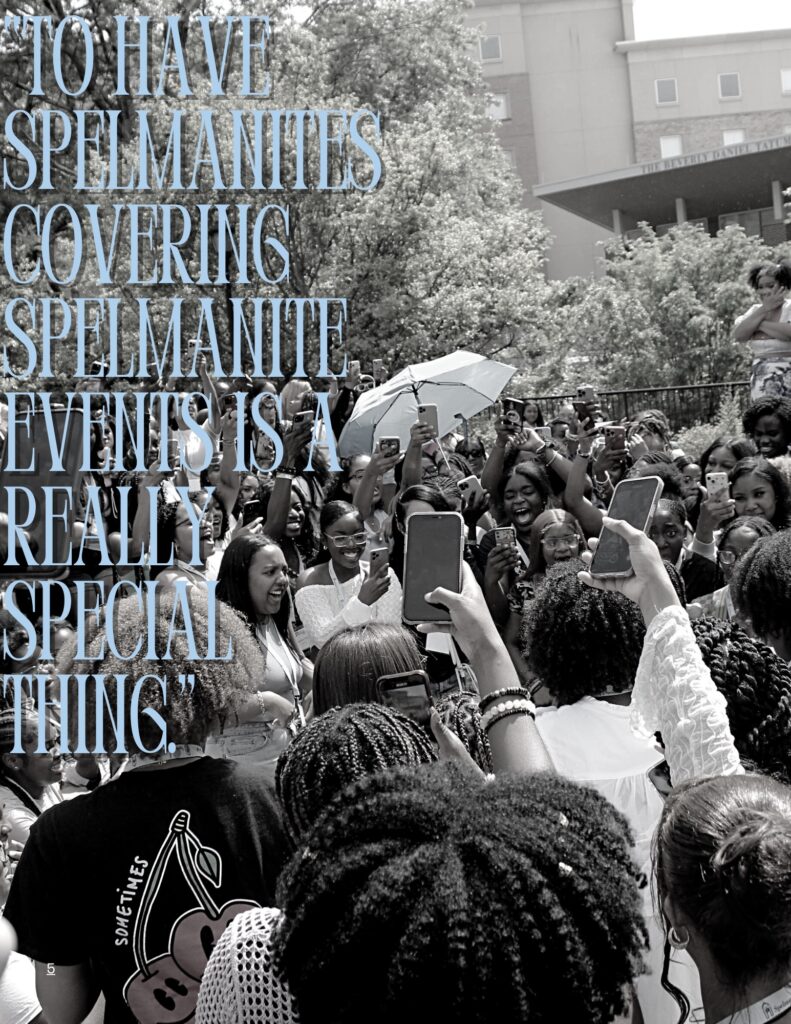
Q. How did you get the opportunity to take pictures for Spelbound?
A. I actually reached out to the Admissions Office. I saw the email they sent out for general volunteers and I couldn’t do that because of scheduling conflicts, but I still wanted to be involved in some capacity. It’s one of those things that photography isn’t something I am pursuing professionally, but it’s a skill in my tool box that can be of service and help out. So I went with a portfolio to see what would happen and they said “Of course.”
They gave me a press pass, which was really cool. I was able to go to all the events that fit within my availability and it was great cause I was able to shadow the paid photographer. I would observe and learn about her settings and her process and that’s always fun. I love when there is more than one photographer because it shows two completely different perspectives on how an event is going. It was one of my highlights from last year.
During my senior year of high school, photography was a daily part of my life but I’ve done it less so at Spelman. But it’s something that I enjoy doing and keeps me fed and keeps me moving creatively so I want to make sure I integrate it into my life as much as possible, so it was important for me to look for opportunities within the spaces I’m in.
Despite it only being her second year at Spelman College, Blair has already proven herself to be a leader through her multiple leadership positions and outside experiences she has earned. As the Managing Editor and Business Manager for The Blueprint, Blair gives us insight on the exciting goals that the organization has planned for the upcoming academic year, including a special print issue coming out this month.
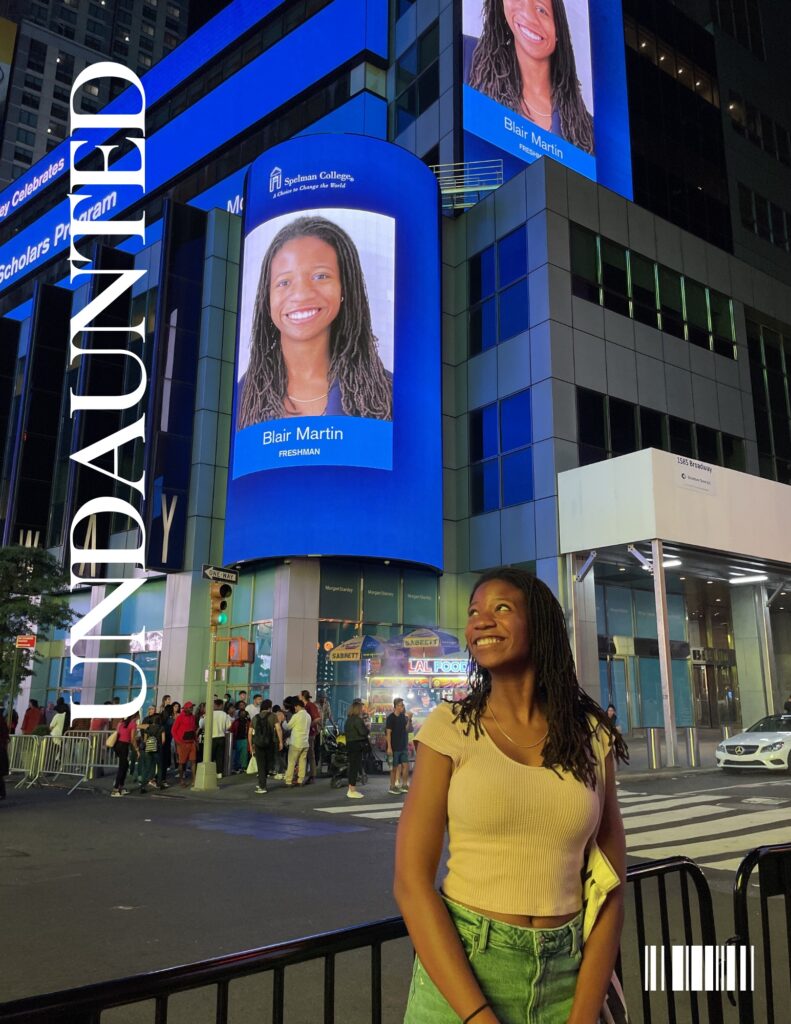 Q. Could you talk about the Blueprint, in regards to your position, your written contributions, and the goal for the publication this year?
Q. Could you talk about the Blueprint, in regards to your position, your written contributions, and the goal for the publication this year?
A. This year, the publication is focused on getting our feet in the dirt and announcing that we’re here and we’re going to cover this school in a way the people across the street can’t. To have Spelmanites covering Spelmanite events is a really special thing. So one of our main goals is to be organized, focused, and making sure we’re using everyone’s abilities to the highest extent. This year, I’m working as the business manager and managing editor. So I handle outreach and making sure people have great opportunities outside of the Blueprint and making sure that we’re hitting our deadlines and marks.
Previously with the Blueprint, I worked as the culture editor, so I took pieces that involved the media, film, and television. For the first issue, I wrote about Abbott Elementary and how it is a very special show right now, How Abbott Elementary Made the A-Grade. It’s not only a show with a Black female showrunner, writer, and producer, it’s also a network television show that’s receiving rewards and prestige that we haven’t seen in the last couple of years with the rise of streaming.
For the founder’s day issue, I wrote about the idea of the “Spelman Woman” and how it was crafted and maintained throughout the history of Spelman. I worked extensively with the archives and went to the library to accurately quote old issues of the Blueprint or student spotlights and provide a coherent and critical analysis.
We have a print issue coming out in October that we are all really excited about, especially because print media is such a special thing nowadays. Having the opportunity to have your name in ink on paper, you want to make sure what you’re presenting on it and representing not only yourself but your institution to the best of its ability.
Q. Is there anything you would like to say to your Spelman sisters?
A. Take advantage of your time. Make sure to take advantage of both the academic and social aspects of being here because they’re both fundamental in making the Spelman experience. Try not to pigeon hole yourself into anything. When you open yourself up to everything around you, you have a more joyful experience moving through life.
The Honors Program Student Association (HPSA) would like to thank Blair for her time to be able to create this special moment to share her experience with her Spelman sisters. We also appreciate our readers who have taken the time to support Blair by reading her story. Remember to be on the lookout for the October issue from The Blueprint and to support your Spelman sisters!

